Energy Efficiency
Mastering Heat Pump Efficiency for Sustainable Homes

Welcome to our guide on how to maximize heat pump efficiency for sustainable homes. We’re here to assist you in understanding heat pump technology and finding the most effective ways to enhance its performance.
With our expertise, you’ll understand the efficiency rating system, learn about key factors affecting heat pump efficiency, and uncover the best practices for maintaining it.
Get ready to save energy and create a more sustainable future for your home. Let’s dive in!
Key Takeaways
- Heat pump technology reduces environmental impact and is cost-effective in the long run.
- The efficiency rating system for heat pumps, based on coefficient of performance (COP), helps homeowners maximize energy savings.
- Proper heat pump sizing, installation techniques, and regular maintenance are key factors affecting heat pump efficiency in sustainable homes.
- Optimizing heat pump performance through regular maintenance, adjusting thermostat settings, and sealing/insulating the home can result in maximum energy savings.
Benefits of Heat Pump Technology for Sustainable Homes
We love the energy-saving benefits of heat pump technology for sustainable homes. Not only does it reduce the environmental impact of our homes, but it also proves to be cost-effective in the long run.
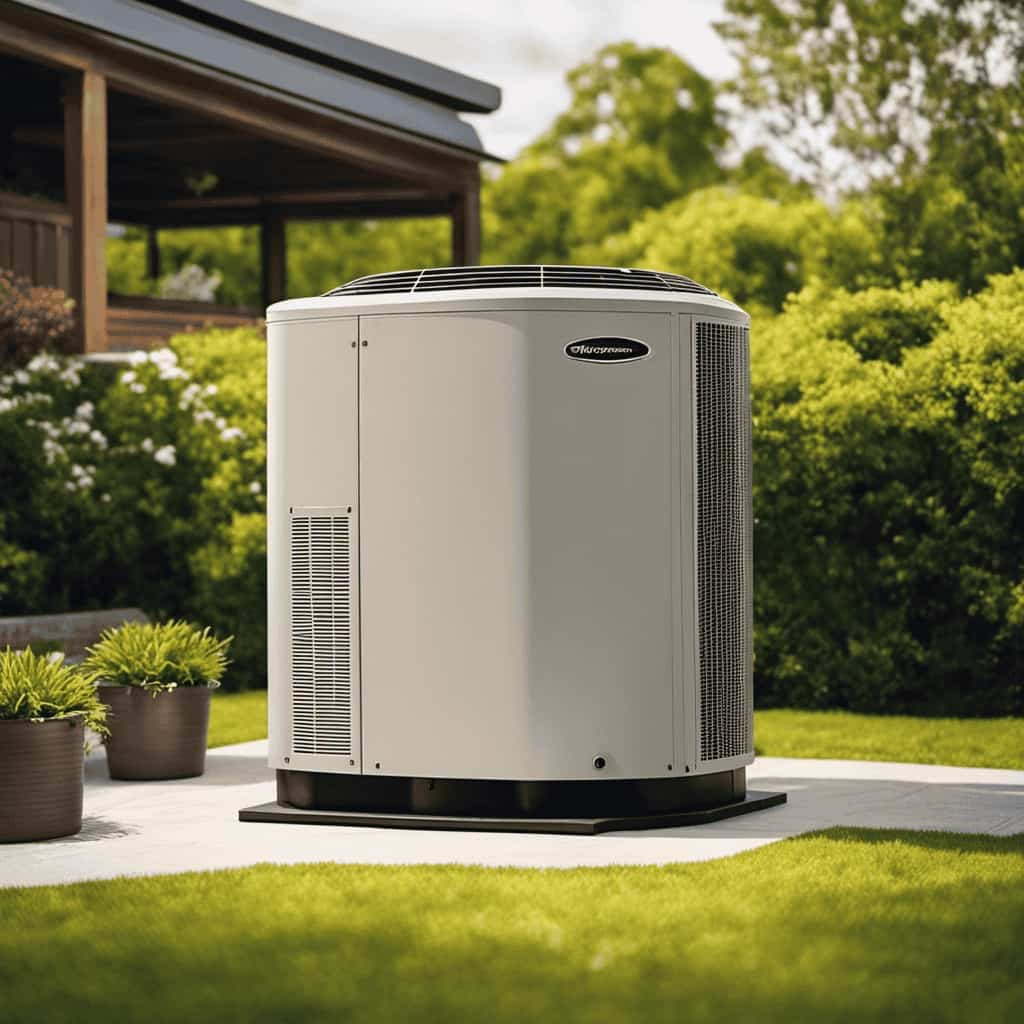
Heat pumps work by transferring heat from one place to another, rather than generating heat through combustion like traditional heating systems. This process requires less energy, resulting in lower electricity bills and reduced carbon emissions. Additionally, heat pumps can provide both heating and cooling, making them versatile and suitable for all climates.
The installation costs of heat pumps may be higher compared to traditional systems, but the energy savings over time make them a worthwhile investment.
Understanding the Efficiency Rating System for Heat Pumps
To fully comprehend the efficiency of heat pumps, we must understand the rating system that quantifies their performance. Heat pump efficiency standards are established to ensure that consumers have a reliable and standardized way to compare the efficiency of different models.
The rating system is based on heat pump efficiency testing, which measures the amount of heat produced by the pump relative to the amount of energy consumed. This is expressed as a ratio known as the coefficient of performance (COP). The higher the COP, the more efficient the heat pump is at converting energy into heat.
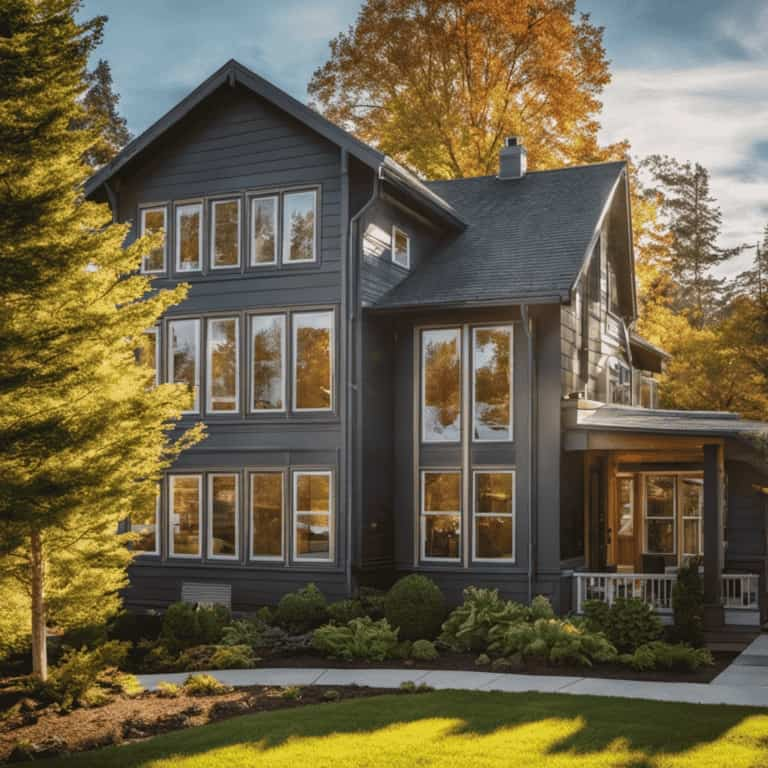
These efficiency ratings provide valuable information to homeowners looking to maximize energy savings and reduce their carbon footprint.
Now that we understand the efficiency rating system, let’s explore the key factors affecting heat pump efficiency in sustainable homes.
Key Factors Affecting Heat Pump Efficiency in Sustainable Homes
Since heat pump efficiency is crucial for sustainable homes, it’s important to understand the key factors that affect it. Here are some factors to consider:
-
Heat pump sizing: Choosing the right size heat pump for your home is essential for optimal efficiency. A heat pump that’s too large or too small won’t operate efficiently and may lead to increased energy consumption.
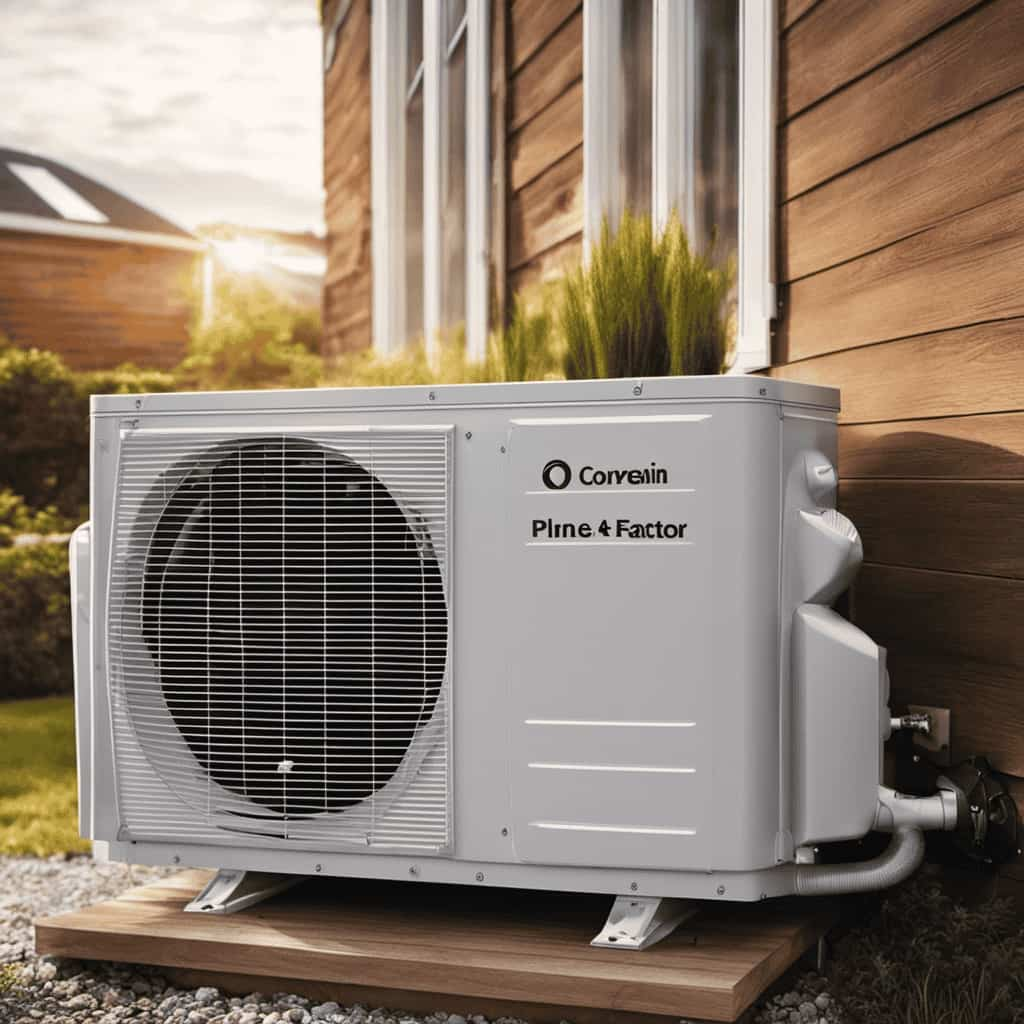
-
Heat pump installation techniques: Proper installation techniques are critical to ensure the efficient operation of a heat pump. This includes correct placement, proper insulation, and adequate airflow. Improper installation can result in reduced efficiency and increased energy usage.
-
Regular maintenance: Regular maintenance, including cleaning and inspection of the heat pump, is necessary to ensure its efficiency. Neglecting maintenance can lead to decreased efficiency and higher energy costs.
Understanding these key factors and taking the necessary steps to address them can help maximize the efficiency of your heat pump and contribute to significant energy savings.
Now let’s explore how to optimize heat pump performance for maximum energy savings.

Optimizing Heat Pump Performance for Maximum Energy Savings
By implementing three key strategies, homeowners can optimize their heat pump performance for maximum energy savings.
First, regular heat pump maintenance is crucial. Cleaning or replacing filters regularly ensures proper airflow and reduces strain on the system. Additionally, inspecting and cleaning the outdoor unit, coils, and fins removes dirt and debris that can hinder performance.
Second, adjusting the thermostat settings can greatly impact energy usage. Lowering the temperature in winter and raising it in summer reduces the workload on the heat pump.
Lastly, sealing and insulating the home helps maintain a constant temperature, reducing the need for the heat pump to work harder.
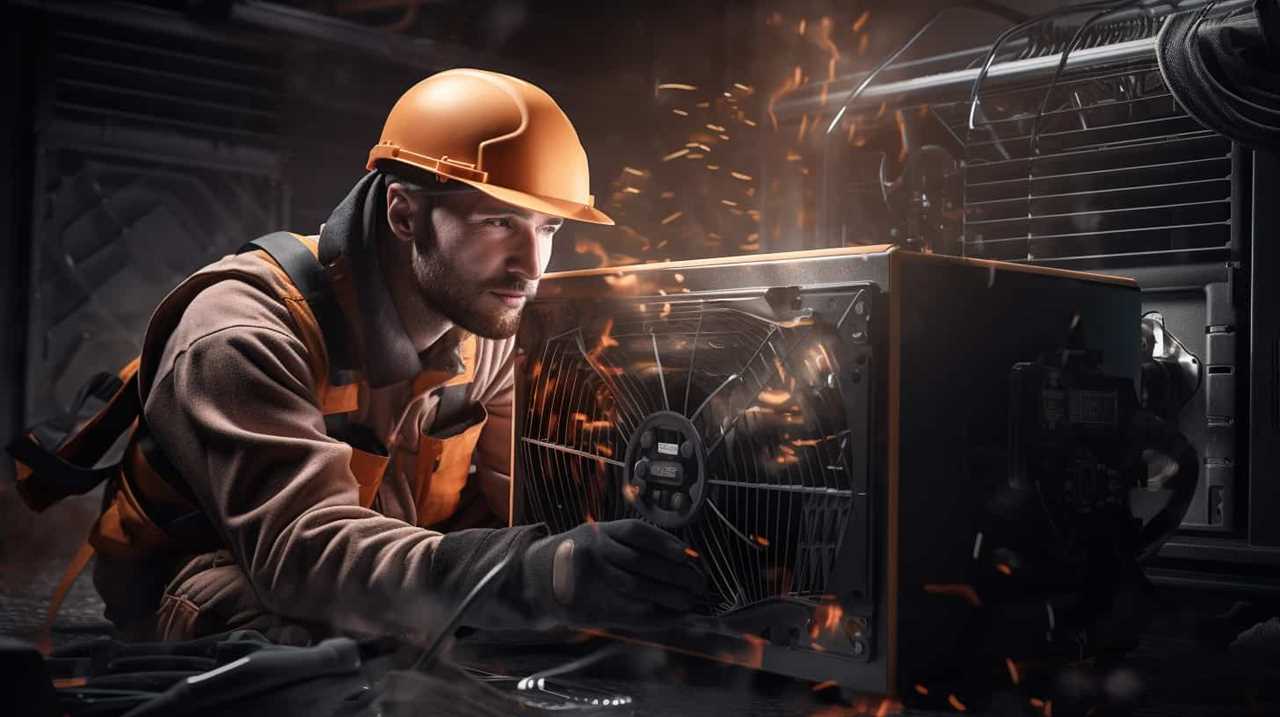
By following these heat pump maintenance tips and energy-saving strategies, homeowners can maximize efficiency and save on energy costs.
Now, let’s delve into the best practices for maintaining heat pump efficiency in sustainable homes.
Best Practices for Maintaining Heat Pump Efficiency in Sustainable Homes
We can ensure optimal heat pump efficiency in sustainable homes by implementing these best practices:
-
Regular heat pump maintenance: Schedule annual maintenance checks with a qualified technician to clean and inspect the system, ensuring it operates at peak efficiency. This includes cleaning or replacing filters, checking refrigerant levels, and lubricating moving parts.
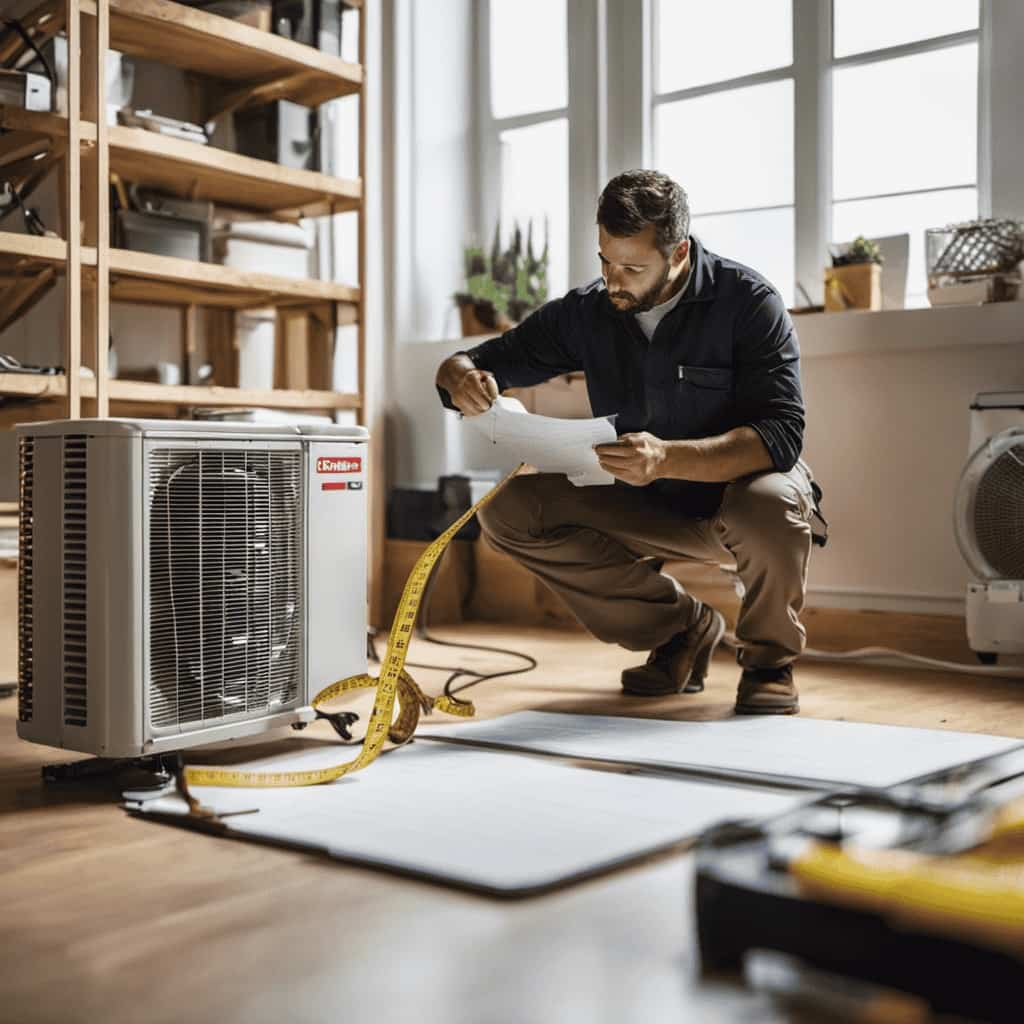
-
Maintain proper airflow: Keep the area around the heat pump clear of debris, vegetation, and obstructions to maximize airflow. Restricted airflow can reduce efficiency and strain the system.
-
Set appropriate temperature settings: Avoid setting the thermostat too high or too low. Optimal temperature settings can help the heat pump operate efficiently and minimize energy consumption.
Frequently Asked Questions
What Are the Different Types of Heat Pumps Available for Sustainable Homes?
There are various types of heat pumps available for sustainable homes. They offer numerous benefits like energy efficiency and reduced carbon emissions. Understanding the different types can help homeowners choose the best option for their needs.
How Do Heat Pumps Compare to Other Heating and Cooling Systems in Terms of Energy Efficiency?
Heat pumps, compared to traditional HVAC systems, offer greater energy efficiency, making them ideal for sustainable homes. Their ability to transfer heat rather than generate it means less energy consumption and lower utility costs.

Can Heat Pumps Be Used in All Climates and Weather Conditions?
Heat pumps can function in various climates and weather conditions, but extreme temperatures can impact their performance. Weather conditions such as cold temperatures or high humidity can affect heat pump efficiency.
Are There Any Government Incentives or Rebates Available for Installing a Heat Pump in a Sustainable Home?
Yes, there are government incentives and rebates available for installing a heat pump in a sustainable home. These can significantly offset heat pump installation costs and provide potential savings from heat pump usage.
What Is the Average Lifespan of a Heat Pump, and What Maintenance Tasks Should Homeowners Regularly Perform to Ensure Its Efficiency?
To ensure efficiency and prolong the average lifespan of a heat pump, homeowners should regularly perform maintenance tasks such as cleaning or replacing air filters, checking refrigerant levels, and scheduling professional inspections.
Conclusion
In conclusion, mastering heat pump efficiency is crucial for creating sustainable homes. By understanding the efficiency rating system and optimizing performance, homeowners can achieve maximum energy savings.

It’s essential to maintain the efficiency of heat pumps through best practices. With these measures in place, we can create homes that not only reduce carbon emissions but also provide comfortable living spaces.
So let’s embrace this technology and pave the way for a greener future!
Energy Efficiency
Cutting-Edge Heat Pump Tech: A Low-Energy Home Solution

We have all the latest information on heat pump technology that can transform your home’s energy efficiency. Wave goodbye to expensive energy bills and say hello to a low-energy home solution.
Our cutting-edge heat pump tech is designed to keep you comfortable while minimizing your environmental impact. With advanced features and benefits galore, choosing the right heat pump for your low-energy home has never been easier.
Let us guide you towards a greener, more sustainable future.
Key Takeaways
- Heat pumps transfer heat from one location to another, providing both heating and cooling functions.
- Heat pump efficiency refers to how well the system converts energy input into useful heat output.
- Cutting-edge heat pump technology includes smart controls and integration with renewable energy sources.
- Low-energy heat pump solutions reduce utility costs, increase energy efficiency, and are compatible with renewable energy sources.
The Basics of Heat Pump Technology
We love exploring the basics of heat pump technology because it offers a low-energy solution for homes.

Heat pump operation is a fascinating process that involves transferring heat from one location to another. It works by extracting heat from a cold space and transferring it to a warmer space, using a refrigerant and a compressor. This allows heat pumps to provide both heating and cooling functions, making them versatile and efficient.
Heat pump efficiency is a crucial aspect to consider when choosing a system for your home. Higher efficiency means the heat pump can effectively transfer more heat while using less energy. This not only reduces your energy consumption but also helps to lower your utility bills.
Understanding the basics of heat pump technology is essential for making informed decisions about energy-efficient home solutions.
Understanding Energy Efficiency in Heat Pumps
Energy efficiency is a key factor to consider when evaluating the performance of heat pumps. When it comes to heat pump efficiency, it refers to how well the system converts energy input into useful heat output. A more efficient heat pump will require less energy to produce the same amount of heat, resulting in lower energy bills and reduced environmental impact.

Heat pump performance, on the other hand, is a measure of how well the system can maintain a desired temperature in different conditions. Factors such as the size, insulation, and location of the home can impact the performance of a heat pump.
Understanding both heat pump efficiency and performance is crucial in making informed decisions about heating and cooling options for your home.
Advanced Features of Cutting-Edge Heat Pump Tech
Some of the advanced features that make cutting-edge heat pump technology stand out include increased efficiency and improved performance. These advancements not only benefit homeowners but also contribute to a more sustainable future. Here are some of the key features that set cutting-edge heat pumps apart:
-
Smart Controls:

-
Cutting-edge heat pumps are equipped with intelligent control systems that optimize performance based on factors such as weather conditions and occupancy patterns. This ensures maximum efficiency and comfort while minimizing energy waste.
-
Smart controls also allow users to remotely monitor and adjust their heat pump settings, providing convenience and flexibility.
-
Renewable Energy Integration:
-
Advanced heat pumps can seamlessly integrate with renewable energy sources such as solar panels or wind turbines. This allows homeowners to harness clean, sustainable energy and further reduce their carbon footprint.

These advanced features not only make cutting-edge heat pump technology efficient and effective but also empower homeowners to make environmentally conscious choices.
Benefits of Low-Energy Heat Pump Solutions
The benefits of low-energy heat pump solutions include reduced utility costs and increased energy efficiency. By implementing these cost-effective solutions, homeowners can save money on their energy bills while also reducing their carbon footprint.
Heat pumps work by transferring heat from one area to another, making them highly efficient compared to traditional heating systems. They can be used for both heating and cooling purposes, providing year-round comfort. Additionally, heat pumps are compatible with renewable energy sources such as solar power, further reducing reliance on fossil fuels.
To maximize energy savings, here are some energy-saving tips:

- Set your thermostat to a comfortable yet efficient temperature.
- Keep doors and windows sealed to prevent heat loss.
- Insulate your home to minimize heat transfer.
Implementing these strategies, along with low-energy heat pump solutions, can lead to significant cost savings and a more sustainable future.
Tips for Choosing the Right Heat Pump for Your Low-Energy Home
When selecting a heat pump for our low-energy home, we should consider factors such as size, efficiency, and compatibility with renewable energy sources. Here are some tips to help you choose the right heat pump for your needs:
-
Heat pump size:
-
Assess the heating and cooling needs of your home to determine the appropriate size of the heat pump.

-
Consult with a professional to ensure accurate sizing calculations.
-
Heat pump installation:
-
Choose a reputable contractor with experience in heat pump installations.
-
Ensure proper installation by following manufacturer guidelines and local building codes.

Frequently Asked Questions
How Long Does It Typically Take for a Heat Pump to Pay for Itself in Energy Savings?
Typically, a heat pump pays for itself in energy savings within a certain period of time, known as the payback period. The length of this period depends on the energy efficiency of the heat pump and the specific usage patterns.
Can a Heat Pump Be Used as the Sole Heating and Cooling System for a Home?
Yes, a heat pump can serve as the sole heating and cooling system for a home. Its efficiency and advantages make it an ideal choice for reducing energy consumption and serving the needs of homeowners.
Are There Any Government Incentives or Tax Credits Available for Installing a Low-Energy Heat Pump?
Yes, there are government incentives and tax credits available for installing a low-energy heat pump. These incentives and credits can help make the cost of installation more affordable and encourage the use of energy-efficient technology.
What Maintenance Is Required for a Heat Pump System?
Heat pump maintenance is crucial to ensure optimal performance. Regularly cleaning or replacing filters, checking refrigerant levels, and inspecting electrical connections can prevent common issues like reduced efficiency or system breakdowns.

Can a Heat Pump Be Integrated With Renewable Energy Sources, Such as Solar Panels or Geothermal Systems?
Yes, a heat pump can be integrated with renewable energy sources like solar panels or geothermal systems. This can greatly increase heat pump efficiency and reduce overall energy costs.
Conclusion
In conclusion, cutting-edge heat pump technology offers a low-energy solution for homes. With advanced features and high energy efficiency, these heat pumps provide numerous benefits for homeowners.
Choosing the right heat pump for your low-energy home is essential, and it’s like finding the perfect puzzle piece that completes the picture of comfort and sustainability.
Embrace this innovative technology and enjoy a cozy and eco-friendly living experience.

Energy Efficiency
Brave the Costs: Monitor Your Heat Pump Energy

Do you feel exhausted from constantly high energy bills? Well, we have some great news for you: keeping track of how much energy your heat pump is using can empower you to manage and lower those costs.
In this article, we’ll show you how to brave the expenses and keep more money in your pocket. We’ll explore the benefits of monitoring, the tools and methods to measure usage, and the key metrics to analyze.
Get ready to optimize your heat pump efficiency and enjoy the freedom of lower energy bills.
Key Takeaways
- Heat pump energy savings can be achieved by transferring heat instead of generating it from scratch.
- Monitoring heat pump energy consumption provides valuable insights into usage patterns and helps identify inefficiencies.
- Smart meters and energy monitoring devices can be used to measure heat pump electricity usage and provide detailed information on energy consumption patterns.
- Optimizing heat pump energy efficiency can be done through regular maintenance, keeping the outdoor unit clear, adjusting thermostat settings, and practicing energy-saving habits.
Understanding Heat Pump Energy Efficiency
We’re going to dive into understanding the energy efficiency of heat pumps.
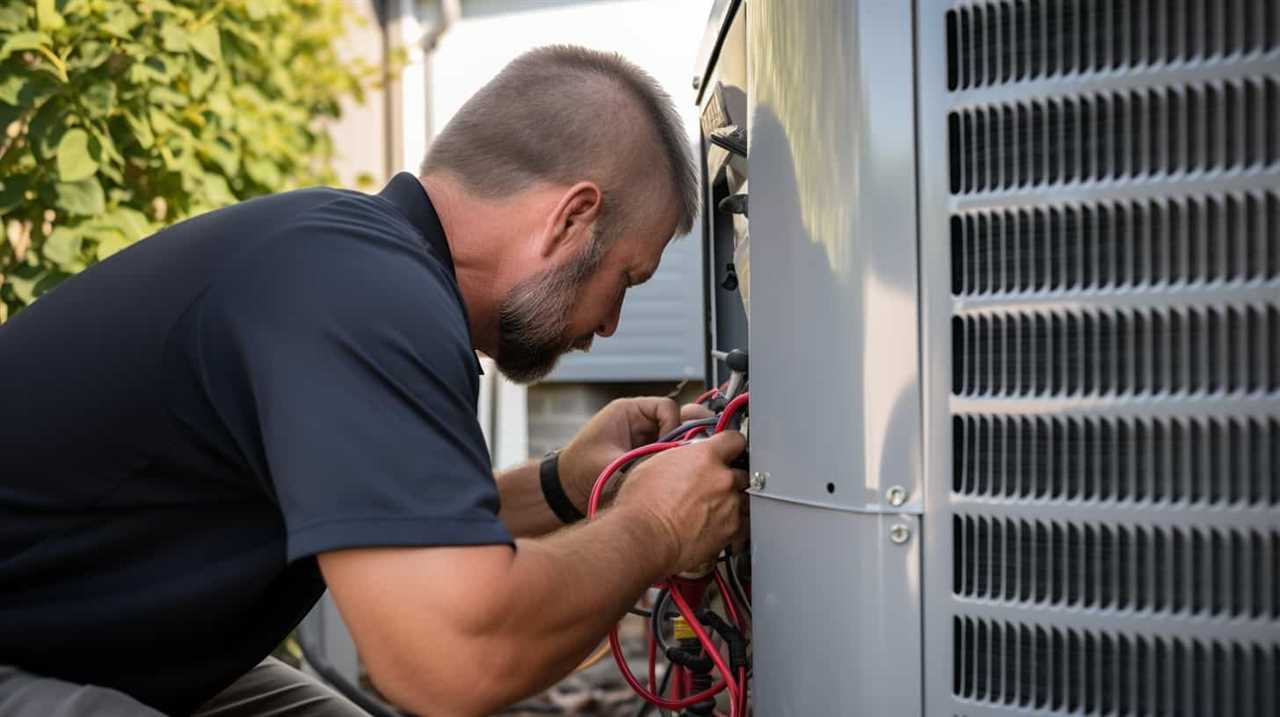
Heat pump energy savings and consumption factors are crucial to consider when evaluating the efficiency of your system. Heat pump energy savings refer to the amount of energy saved by using a heat pump instead of other heating or cooling methods. This is achieved through the transfer of heat from one area to another, rather than generating heat from scratch.
However, there are several factors that can affect the energy consumption of a heat pump. These include the size and efficiency of the unit, the climate in which it operates, and the insulation and sealing of the building.
Benefits of Monitoring Your Heat Pump Energy Consumption
By monitoring our heat pump energy consumption, we can gain valuable insights into our usage patterns and make more informed decisions about energy efficiency. Energy monitoring techniques allow us to track and analyze our energy usage in real-time, providing us with a comprehensive understanding of how our heat pump is performing.
This information enables us to identify any inefficiencies or areas for improvement, allowing us to make adjustments and optimize our energy consumption. Not only does this result in cost savings, but it also contributes to a more sustainable and environmentally friendly lifestyle.
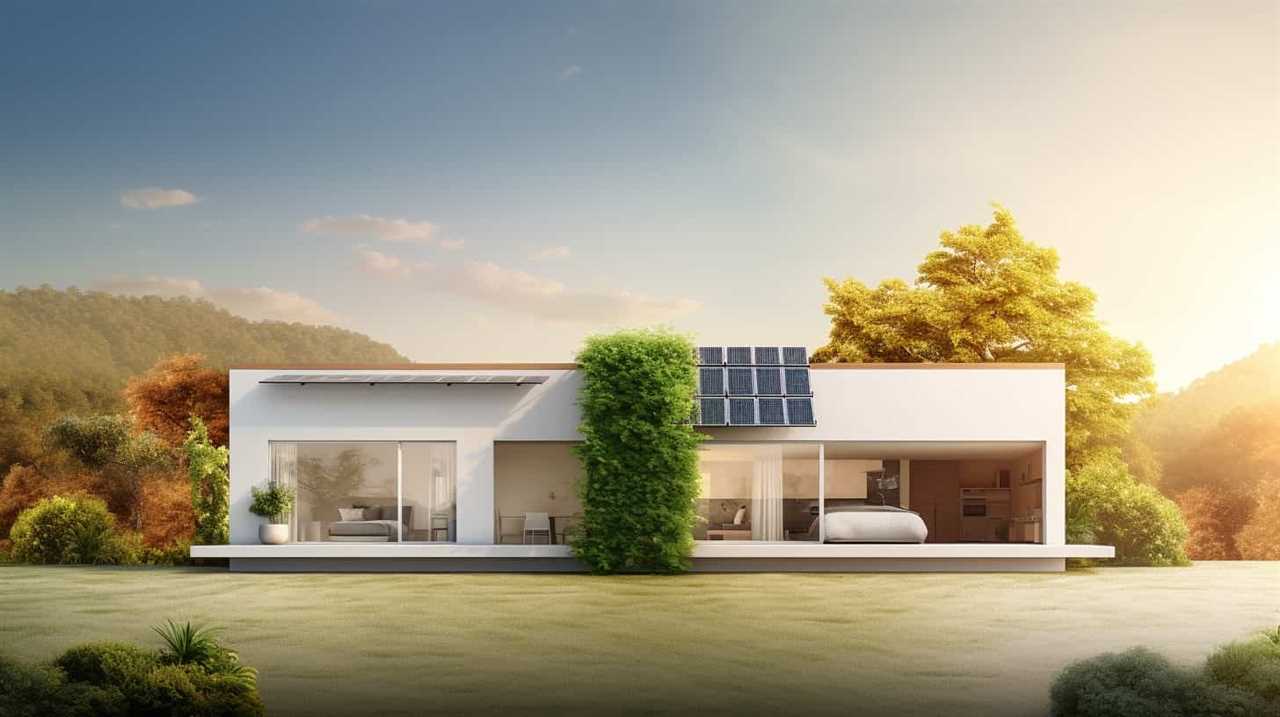
Tools and Methods to Measure Heat Pump Electricity Usage
To accurately measure our heat pump electricity usage, we’ll need the right tools and methods.
One effective tool is a smart meter, which can provide real-time data on our energy consumption. Smart meters are installed by utility companies and can automatically send usage information to both the customer and the utility provider. This allows us to monitor our heat pump energy usage and make adjustments to optimize efficiency.
Another option is to use energy monitoring devices, such as plug-in monitors or whole-house energy monitors. These devices can be easily installed and provide detailed information on our heat pump’s electricity usage.
By utilizing these tools, we can gain insights into our energy consumption patterns and identify potential areas for improvement.

Transitioning into the next section, let’s now explore the key metrics we should monitor when analyzing heat pump energy data.
Analyzing Heat Pump Energy Data: Key Metrics to Monitor
Let’s examine the key metrics we should monitor when analyzing heat pump energy data. To effectively manage heat pump energy and achieve savings, it’s crucial to keep track of the following metrics:
-
Energy Consumption: Monitoring the amount of energy consumed by your heat pump is essential in understanding its efficiency and identifying potential areas for improvement. By tracking energy consumption over time, you can identify patterns and adjust your usage accordingly to optimize energy savings.
-
System Performance: Evaluating the performance of your heat pump is vital for identifying any issues or inefficiencies. Monitoring metrics such as heating and cooling capacity, COP (Coefficient of Performance), and system runtimes can help you identify any fluctuations or deviations from expected performance levels.

-
Temperature Differential: Monitoring the temperature differential across the heat pump system can provide insights into its efficiency and effectiveness. By measuring the temperature difference between the outdoor and indoor units, you can assess the heat pump’s ability to transfer heat effectively and make necessary adjustments for improved energy management.
Tips for Optimizing Heat Pump Energy Efficiency
To maximize our heat pump’s energy efficiency, we should implement these tips.
Regular heat pump maintenance is crucial in ensuring optimal performance and energy savings. Schedule annual professional inspections to clean and tune the system, check for any leaks or issues, and replace filters as needed.
Additionally, keep the outdoor unit clear of debris and vegetation to allow for proper airflow.

Adjusting the thermostat settings can also contribute to energy savings. Set the temperature a few degrees lower in the winter and higher in the summer to reduce the workload on the heat pump. Utilize programmable thermostats to automatically adjust the temperature when you’re away from home.
Lastly, practicing energy-saving habits such as sealing air leaks, properly insulating your home, and using ceiling fans can further enhance the efficiency of your heat pump.
Frequently Asked Questions
Are Heat Pumps More Energy-Efficient Than Traditional Heating and Cooling Systems?
Yes, heat pumps are more energy-efficient than traditional heating and cooling systems. When comparing their performance, heat pumps use less energy to produce the same amount of heat or cool air, resulting in lower energy costs.
How Much Money Can I Save by Monitoring My Heat Pump Energy Consumption?
By tracking our heat pump energy consumption, we can save money. Monitoring allows us to identify inefficiencies and make adjustments to maximize heat pump energy savings. It gives us the freedom to control our costs and be more energy-efficient.

Can I Use a Smart Thermostat to Monitor My Heat Pump Energy Usage?
Yes, we can use a smart thermostat to monitor our heat pump energy usage. It provides benefits such as energy saving tips and allows us to have more freedom and control over our heating and cooling systems.
What Are the Most Common Causes of Energy Inefficiency in Heat Pumps?
The most common causes of energy inefficiency in heat pumps include improper installation, lack of maintenance, clogged filters, and outdated equipment. Regular monitoring and addressing these issues can help improve energy efficiency and reduce costs.
Is It Possible to Compare My Heat Pump’s Energy Usage With Similar Models to See if It’s Performing Optimally?
Yes, it is possible to compare our heat pump’s energy usage with similar models to determine if it’s performing optimally. This can help us identify inefficiencies and realize the benefits of heat pump monitoring.
Conclusion
In conclusion, monitoring your heat pump energy consumption is a wise investment that can yield significant benefits. By understanding your heat pump’s efficiency and analyzing key metrics, you can optimize its performance and reduce energy costs.

With the right tools and methods, you can accurately measure and track your heat pump’s electricity usage. So, don’t shy away from the costs; instead, embrace the opportunity to save money and energy by monitoring your heat pump’s energy.
Energy Efficiency
Revamp Green Constructions: Amping Up Heat Pump Efficiency

Welcome to the world of green construction, where our mission is to enhance and optimize heat pump efficiency.
Join us as we explore the intricacies of heat pump technology, uncover the key factors that impact efficiency in green buildings, and delve into innovative strategies to enhance performance.
Together, we will discover the best practices for maintaining optimal heat pump efficiency in these sustainable constructions, empowering you with the mastery to create a greener future.
Key Takeaways
- Maximizing heat pump efficiency reduces energy consumption and contributes to substantial energy savings.
- Factors such as system sizing, ductwork design, and insulation impact heat pump efficiency.
- Regular maintenance and timely repairs ensure the heat pump operates at peak performance.
- Implementing innovative strategies such as smart control systems and heat recovery systems enhances heat pump performance and increases energy efficiency.
The Importance of Heat Pump Efficiency in Green Constructions
We believe that maximizing heat pump efficiency is crucial in green constructions. A well-designed and properly installed heat pump system can significantly reduce energy consumption and contribute to substantial energy savings. Achieving optimal efficiency is of utmost importance when it comes to heat pump installation.
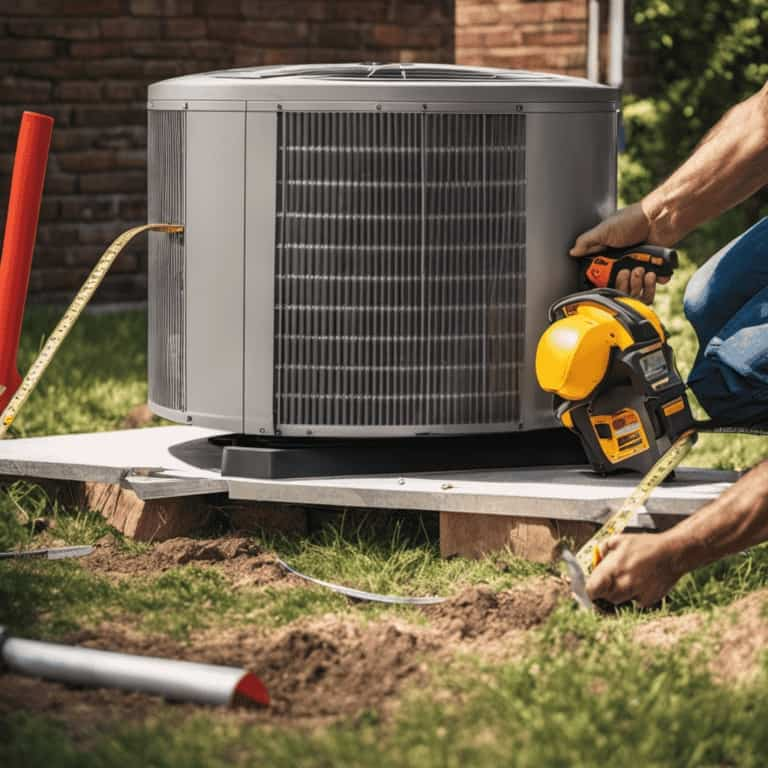
To maximize efficiency, careful consideration must be given to factors such as system sizing, ductwork design, and insulation. Proper insulation ensures minimal heat loss, while efficient ductwork design reduces air leakage and heat transfer. Regular maintenance and timely repairs are also essential to ensure that the heat pump operates at peak performance.
Understanding the Basics of Heat Pump Technology
To fully understand the basics of heat pump technology, it is important to grasp the concept of how heat pumps work and the key components involved. Heat pumps operate on the principle of transferring heat from one place to another using refrigerant. They consist of four main components: the evaporator, compressor, condenser, and expansion valve. The refrigerant absorbs heat from the indoor air at the evaporator, then passes through the compressor where it is pressurized. The hot, pressurized refrigerant then releases heat to the outdoor air at the condenser. Finally, the expansion valve reduces the pressure of the refrigerant, preparing it to start the cycle again. Heat pumps also have energy-saving features such as variable speed motors and smart controls, allowing for more precise temperature control and increased efficiency. Understanding the operation and energy-saving features of heat pumps is crucial in maximizing their performance and achieving optimal energy efficiency.
| Component | Function |
|---|---|
| Evaporator | Absorbs heat from indoor air |
| Compressor | Pressurizes the refrigerant |
| Condenser | Releases heat to outdoor air |
| Expansion Valve | Reduces pressure of the refrigerant |
Key Factors Affecting Heat Pump Efficiency in Green Buildings
Improving heat pump efficiency in green buildings requires optimizing key factors such as insulation and airflow. Building design plays a vital role in ensuring the efficiency of heat pumps.
Proper insulation helps to minimize heat loss or gain, reducing the workload on the heat pump and improving energy consumption. The design should also consider the orientation of the building, taking advantage of natural sunlight and shading to optimize energy usage.

Adequate airflow is essential for heat pump efficiency as it ensures proper heat transfer and distribution throughout the building. This can be achieved through well-designed ventilation systems that promote air circulation and prevent stagnation.
Innovative Strategies to Enhance Heat Pump Performance
By implementing advanced technologies and adopting smart control systems, we can effectively enhance heat pump performance in green buildings. Smart control systems enable real-time monitoring and optimization of heat pump operations, ensuring maximum efficiency and energy savings. These systems use advanced algorithms to analyze data from sensors and adjust the heat pump’s settings accordingly. Additionally, incorporating energy saving features such as variable speed compressors and heat recovery systems can further improve heat pump performance. Variable speed compressors allow the heat pump to adjust its output based on the building’s heating or cooling demands, reducing energy consumption. Heat recovery systems capture waste heat generated by the heat pump and repurpose it for other applications, increasing overall energy efficiency. By implementing these innovative strategies, we can achieve higher heat pump efficiency and contribute to greener and more sustainable buildings.
| Innovative Strategies to Enhance Heat Pump Performance | Benefits |
|---|---|
| Smart control systems | Real-time monitoring and optimization of heat pump operations |
| Energy saving features | Reduction in energy consumption and increased efficiency |
| Variable speed compressors | Adjusting output based on building’s heating/cooling demands |
| Heat recovery systems | Repurposing waste heat for other applications |
Best Practices for Maintaining Optimal Heat Pump Efficiency in Green Constructions
We can achieve optimal heat pump efficiency in green constructions by implementing three key best practices: regular maintenance, proper insulation, and optimal thermostat settings. By following these energy-saving tips, we can ensure that our sustainable HVAC systems operate at peak performance, reducing energy consumption and saving costs in the long run.
-
Regular Maintenance: Schedule annual maintenance checks to clean filters, check refrigerant levels, and inspect the overall system for any issues. This will prevent inefficiencies and ensure the heat pump operates optimally.

-
Proper Insulation: Proper insulation in the building envelope, including walls, floors, and ceilings, minimizes heat transfer and maximizes the efficiency of the heat pump by reducing the need for additional heating or cooling.
-
Optimal Thermostat Settings: Set the thermostat to an energy-efficient temperature range, such as 68-72°F in winter and 74-78°F in summer, to avoid unnecessary energy consumption and maintain comfort levels.
-
Smart Thermostats: Consider upgrading to a smart thermostat that can learn your schedule, adjust settings automatically, and provide energy usage data for further optimization.
Frequently Asked Questions
How Does Heat Pump Efficiency Impact Overall Energy Consumption in Green Constructions?
Heat pump efficiency plays a vital role in reducing overall energy consumption in green constructions. Proper insulation ensures minimal heat loss, while regular maintenance optimizes performance. These measures enhance energy efficiency and contribute to sustainable building practices.

What Are the Different Types of Heat Pump Technology Available for Green Buildings?
Geothermal and air source heat pumps are the two main types of heat pump technology available for green buildings. Geothermal heat pumps utilize the constant temperature of the earth, while air source heat pumps extract heat from the outside air.
Can the Location and Climate of a Building Affect the Efficiency of Heat Pumps?
Heat pump placement and the climate of a building can significantly impact the efficiency of heat pumps. It is crucial to consider these factors when designing green constructions to maximize energy savings and minimize environmental impact.
Are There Any Government Incentives or Programs Available to Promote the Use of Energy-Efficient Heat Pumps in Green Constructions?
Yes, there are government incentives and financial programs available to promote the use of energy-efficient heat pumps in green constructions. These programs aim to encourage the adoption of greener technologies and reduce carbon emissions.
What Are Some Common Mistakes or Pitfalls to Avoid When Trying to Maintain Optimal Heat Pump Efficiency in Green Buildings?
When it comes to maintaining optimal heat pump efficiency in green buildings, avoiding common mistakes and pitfalls is crucial. We can improve efficiency by implementing smart strategies in sustainable constructions.
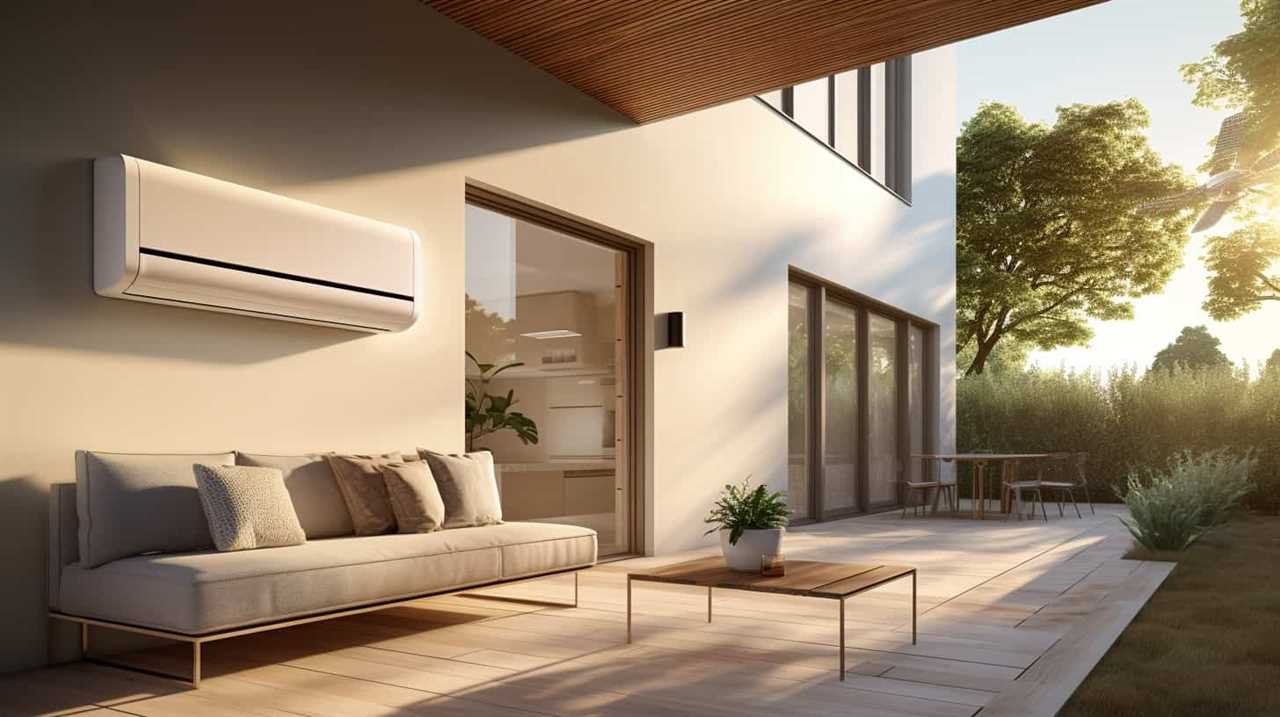
Conclusion
In conclusion, maximizing heat pump efficiency is crucial for green constructions. By understanding the basics of heat pump technology and implementing innovative strategies, we can enhance their performance.
Regular maintenance and adherence to best practices are also essential for maintaining optimal efficiency.
So, why settle for anything less when we can revamp green constructions and amp up heat pump efficiency? Let’s strive for a sustainable future that prioritizes energy efficiency and environmental responsibility.
-

 Residential and Commercial Applications3 months ago
Residential and Commercial Applications3 months agoBest Amana Heat Pump Reviews
-

 Thermal Energy Transfer3 months ago
Thermal Energy Transfer3 months agoBreakthroughs in Modern Heat Pump Systems: Thermal Energy Edition
-

 Residential and Commercial Applications3 months ago
Residential and Commercial Applications3 months agoBest Heat Pump
-

 Geothermal Heat Pumps2 months ago
Geothermal Heat Pumps2 months agoUpgrade Your Comfort with Our Efficient HVAC Systems
-

 Geothermal Heat Pumps2 months ago
Geothermal Heat Pumps2 months agoInnovative Geothermal Heat Pump Manufacturers Revolutionize Energy Efficiency
-

 Air Conditioning4 weeks ago
Air Conditioning4 weeks agoExploring Energy-Efficient Air Conditioning Heat Pumps
-

 Thermal Energy Transfer3 months ago
Thermal Energy Transfer3 months agoBoost Your Heat Pump Efficiency: Interactive Guide
-

 Residential and Commercial Applications3 months ago
Residential and Commercial Applications3 months agoBest Portable Heat Pump Heat & AC











